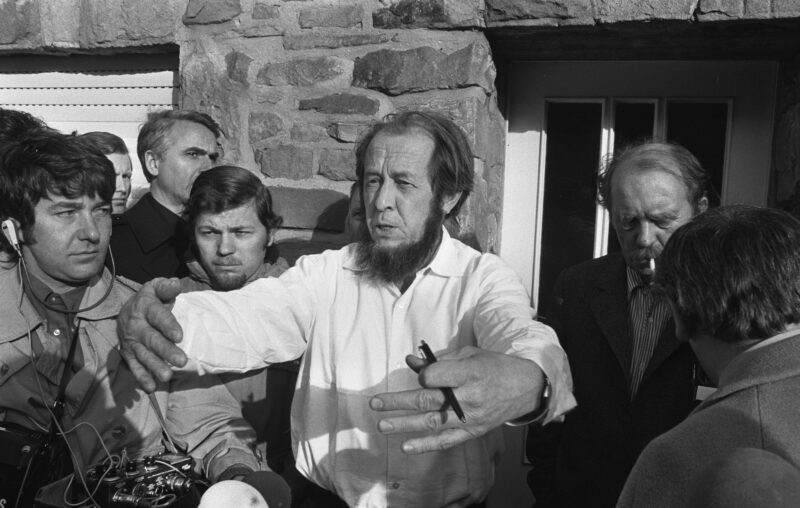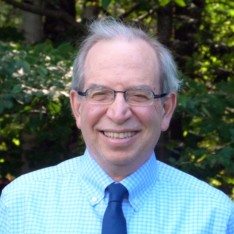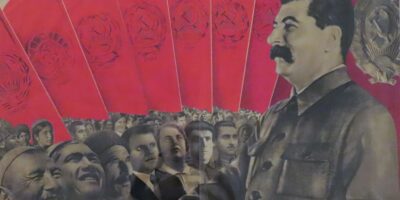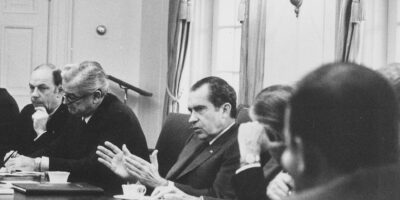Why Solzhenitsyn’s Line Between Good and Evil Matters

We want to think that the line between good and evil is clear and that individuals fall into one camp or another. In The Gulag Archipelago, Volume 1, Aleksandr Solzhenitsyn wrote, “If only it were all so simple! If only there were evil people somewhere insidiously committing evil deeds, and it were necessary only to separate them from the rest of us and destroy them.”
Because the line between good/evil is not as straightforward as we wish, an essential principle for organizing society is, in F. A. Hayek’s words, to ensure that a “bad man can do least harm.”
Many know these famous words by Solzhenitsyn in The Gulag Archipelago, Volume 2: “The line separating good and evil passes not through states, nor between classes, nor between political parties either—but right through every human heart—and through all human hearts.”
Those who deny this truth of human nature often believe that giving “good” people – those possessing the right ideology – enough power to control others solves the problem of organizing society.
Solzhenitsyn’s famous line doesn’t appear until page 746, and most people are unaware of the context. The famous sentence begins, “Gradually it was disclosed to me that the line separating good…”
Who disclosed this truth to Solzhenitsyn? It was his own experiences in the Gulag.
In the same section of his book, he wrote, “Looking back, I saw that for my whole conscious life I had not understood either myself or my strivings.” He then draws out what he saw in himself:
It was granted me to carry away from my prison years on my bent back, which nearly broke beneath its load, this essential experience: how a human being becomes evil and how good. In the intoxication of youthful successes I had felt myself to be infallible, and I was therefore cruel. In the surfeit of power I was a murderer, and an oppressor.
Insightfully, Solzhenitsyn saw the fallacy of using good intentions as a guide to action: “In my most evil moments I was convinced that I was doing good, and I was well supplied with systematic arguments.”
The worst villains can delude themselves into thinking they are doing good. We should not be fooled into believing that freedom can be preserved by relying on good people’s good intentions.
Take an honest look at your stream of thinking and notice how self-interested it is. Yes, notice your thoughts of kindness and generosity toward others, too. But there is no reason for society to trust your good intentions, or mine, with the power to control others.
To find goodness, Solzhenitsyn had first to see his darkness. And then, having done so, a path to goodness opened up: “And it was only when I lay there on rotting prison straw that I sensed within myself the first stirrings of good.”
Following his famous sentence about “the line separating good and evil” Solzhenitsyn wrote, “This line shifts. Inside us, it oscillates with the years. And even within hearts overwhelmed by evil, one small bridgehead of good is retained. And even in the best of all hearts, there remains . . . an un-uprooted small corner of evil.”
That the line between good and evil oscillates is a truth Solzhenitsyn expressed repeatedly. In Volume 1, he wrote:
During the life of any heart this line [between good and evil] keeps changing place; sometimes it is squeezed one way by exuberant evil and sometimes it shifts to allow enough space for good to flourish. One and the same human being is, at various ages, under various circumstances, a totally different human being. At times he is close to being a devil, at times to sainthood.
Clearly, Solzhenitsyn wanted us to understand our work is never done. Cultivating our goodness is the work of a lifetime.
In both Volumes 1 and 2, Solzhenitsyn repeats Socrates’s admonition, “’Know thyself.” In Volume 2, he added, “There is nothing that so aids and assists the awakening of omniscience within us as insistent thoughts about one’s own transgressions, errors, mistakes.”
It’s not only the other guy Solzhenitsyn was writing about. Evil can come through any of us if we don’t work to recognize and choose against it. Solzhenitsyn would say we are deluding ourselves when we think evil is only out there. This is a truth that continues to be vindicated.
Recently, Jonathan Mayo compiled new details of the November 2008 terror attack when ten youthful terrorists from the Pakistani group Lashkar-e-Tayyiba murdered 164 people in Mumbai, India. Their targets were ordinary Mumbai residents, people at a Jewish Center, and visitors at a famed hotel catering to tourists.
What stood out about the attack is that in real-time, the ten terrorists were in communication with controllers, messaging them from Pakistan.
Mayo reports that while terrorists were at the Taj Mahal Palace hotel, they received messages that the controllers in Pakistan “are furious there is no sign of a fire at the Taj.” The controllers phoned the youthful terrorists: “Nothing is going to happen until you start the fire. When people see the flames they will begin to be afraid. And throw some grenades, my brother. There’s no harm in throwing a few grenades.”
The terrorists in the hotel seemed “overwhelmed by the opulence of the hotel and [told] their handlers: ‘There are computers here with high tech screens! It’s amazing!’ The controller [insisted] they ‘start a proper fire’ immediately.”
After the attack, one terrorist at the train station drove to a police roadblock and said: “Please sir, I have done what I came to do. Please kill me.” The young man told police that “his father, a street seller, sold him to [the terrorist group], telling his son: ‘We’ll have money, we won’t be poor anymore.’”
The line between good and evil, even in the youthful terrorists, was moving in real-time.
Solzhenitsyn’s testimony helps us see that evil cannot be eliminated, but, in his words, “it is possible to constrict it within each person.”
If Solzhenitsyn is correct about the potential for evil existing in each of us, then Thomas Sowell, in his book A Conflict of Visions, has an important warning:
Each new generation born is in effect an invasion of civilization by little barbarians, who must be civilized before it is too late. Their prospects of growing up as decent, productive people depends on the whole elaborate set of largely unarticulated practices which engender moral values, self-discipline, and consideration for others.
Steven Pinker echoed Solzhenitsyn when he wrote, “Humans are not innately good (just as they are not innately evil), but they come equipped with motives that can orient them away from violence and toward cooperation and altruism.”
It would be a foolish bet to expect that each person will grow up civilized and exercise their moral agency to turn towards good. Human cooperation and flourishing are enabled by moral traditions and the rule of law that constrains evil.
When unconstrained ideology triumphs over rights and morality, we quickly discover how fast evil triumphs over good.
In contrast, the extended social order created by the free market expands our opportunities to cooperate with others, and crucially, accepts human nature for what it is. The more we cooperate, the more we see our well-being depends on others. The thicker the interdependence, the greater the incentives to cultivate the good side of our human nature.










